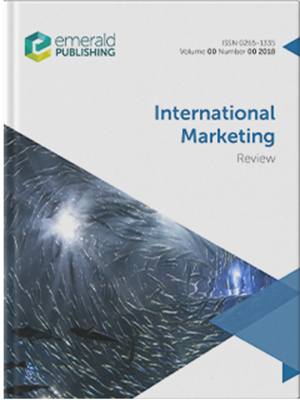What induces corporations to engage in controversial marketing and environmental practices? A linguistic perspective
IF 4.8
3区 管理学
Q1 BUSINESS
引用次数: 0
Abstract
PurposeLinguists classify the world’s languages into two types: futured and futureless. Futured languages (e.g. French) require speakers to grammatically mark future events, a construction that is optional in futureless languages such as German. This treatise examines whether the grammatical structure of the predominant language in a given country explains firms’ propensity to engage in controversial marketing and environmental management practices. This is expected to happen because a speaker’s future time perspective and temporal discounting vary depending on the type of language used.Design/methodology/approachThe sample period for this research was from 2001 to 2020. The sample of the study consists of 5,275 firms representing 47 countries. The sample is comprised of firms from 29 countries where the predominant language is a strong future time reference (FTR) language and 18 countries with a weak-FTR language. The maximum number of firm-country-year observations of the study was 39,956. This study employed multi-level mixed effects modelling as well as other relevant estimation techniques such as random effect panel regression, ordinary least square regression and two-stage least square regression.FindingsThis research empirically demonstrates that firms based in countries where the predominant language requires speakers to grammatically differentiate between the present and the future – known as strong-FTR or futured languages – engage more often in controversial marketing- and environment-related practices than those located in countries where the predominant language does not necessarily require grammatical differentiation between the present and the future (known as weak-FTR or futureless languages).Practical implicationsThe findings are important for managers of firms with foreign subsidiary operations: top management teams of such firms need to be aware that their foreign subsidiaries’ propensity to engage in controversial marketing and environmental management practices varies depending on the predominant language those subsidiaries use. Also, firms located in countries with weak-FTR languages need to be more rigorous in their selection process when considering forming a joint venture or acquiring a firm in countries with strong-FTR languages.Originality/valueThe current research enriches the burgeoning body of literature on the effect of language on corporate decision-making. It extends the body of knowledge on the impact of language structure on firms’ inclination to engage in controversial marketing and environmental management practices.是什么促使企业采取有争议的营销和环保做法?语言学视角
目的语言学家将世界上的语言分为两类:有未来语和无未来语。有未来的语言(如法语)要求说话者在语法上标记未来事件,而在德语等无未来的语言中,这种结构是可选的。本论文探讨了特定国家主要语言的语法结构是否能解释企业从事有争议的营销和环境管理实践的倾向。预计会出现这种情况,因为说话者的未来时间视角和时间折扣会因使用的语言类型而不同。设计/方法/途径本研究的样本期为 2001 年至 2020 年。研究样本由代表 47 个国家的 5275 家公司组成。样本由来自 29 个国家的企业和 18 个国家的企业组成,前者的主要语言是强未来参照语言(FTR),后者的主要语言是弱未来参照语言。研究中的企业-国家-年份观测值最多达到 39 956 个。本研究采用了多层次混合效应模型以及其他相关估计技术,如随机效应面板回归、普通最小二乘法回归和两阶段最小二乘法回归。研究结果这项研究通过经验证明,与那些主要语言不一定要求语法上区分现在和未来的国家(被称为强FTR或有未来语言)的企业相比,那些主要语言要求语法上区分现在和未来的国家(被称为弱FTR或无未来语言)的企业更经常采取有争议的营销和环境相关做法。研究结果对拥有国外子公司的企业管理者非常重要:这些企业的高层管理团队需要意识到,其国外子公司从事有争议的营销和环境管理实践的倾向因子公司使用的主要语言而异。此外,位于外语能力较弱国家的公司在考虑成立合资企业或收购外语能力较强国家的公司时,需要更加严格地进行选择。它扩展了关于语言结构对企业参与有争议的营销和环境管理实践的倾向的影响的知识体系。
本文章由计算机程序翻译,如有差异,请以英文原文为准。
求助全文
约1分钟内获得全文
求助全文
来源期刊

International Marketing Review
BUSINESS-
CiteScore
8.70
自引率
12.00%
发文量
55
期刊介绍:
International Marketing Review (IMR) is a journal that has, as its core remit, the goal of publishing research that pushes back the boundaries of international marketing knowledge. IMR does this by publishing novel research ideas, and by publishing papers that add substance to, question the basic assumptions of, reframe, or otherwise shape what we think we know within in the international marketing field. IMR is pluralistic, publishing papers that are conceptual, quantitative-empirical, or qualitative-empirical. At IMR, we aim to be a journal that recognizes great papers and great research ideas, and works hard with authors to nurture those ideas through to publication. We aim to be a journal that is proactive in developing the research agenda in international marketing, by identifying critical research issues, and promoting research within those areas. Finally, IMR is a journal that is comfortable exploring, and that fosters the exploration of, the interfaces and overlaps between international marketing and other business disciplines. Where no interfaces or overlaps exist, IMR will be a journal that is ready to create them. IMR’s definition of international marketing is purposefully broad and includes, although is not restricted to: -International market entry decisions and relationships; -Export marketing and supply chain issues; -International retailing; -International channel management; -Consumer ethnocentrism, country and product image and origin effects; -Cultural considerations in international marketing; -International marketing strategy; -Aspects of international marketing management such as international branding, advertising and new product development.
 求助内容:
求助内容: 应助结果提醒方式:
应助结果提醒方式:


